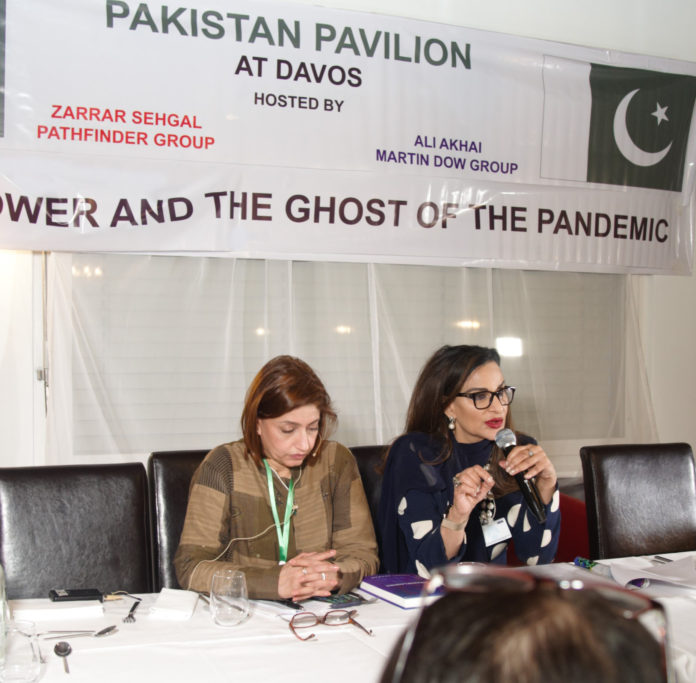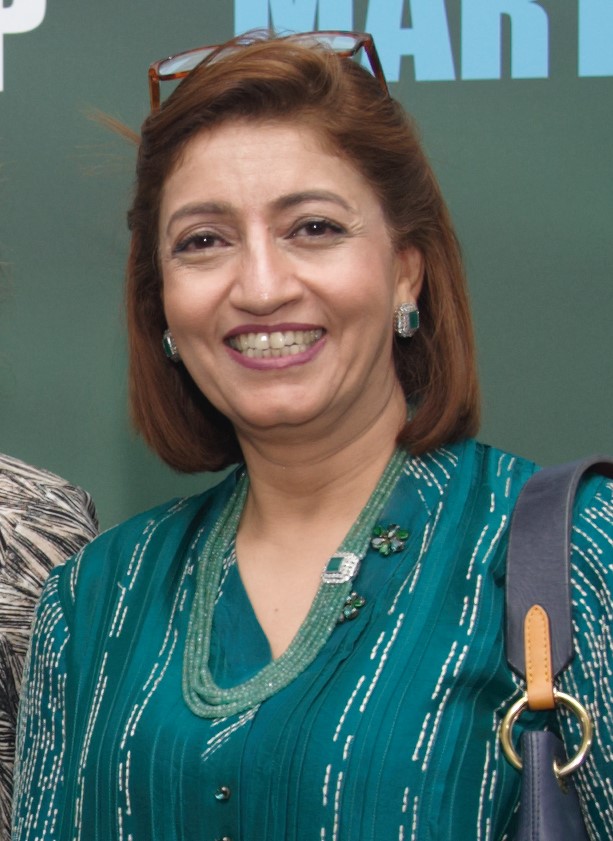
Dr. Huma Baqai, Sr. Vice Chairperson KCFR: So the topic which Sherry chose herself is Women’s Power and the Curse of Pandemic. I was just in a discussion with Sherry before I stepped in here, and I said what about girls who did not go back to school? And Sherry said that’s nothing, the real problem is that every three women out of five, suffered from domestic violence during the pandemic and those are real statistics. But that’s not all that happened, a lot more happened especially when you’re in a country like Pakistan where, perhaps, women like Sherry and if I may say myself and a couple of others who are sitting there are not the face of women of Pakistan, but perhaps they are a hope for the women living in Pakistan. Senator Sherry Rehman is hope for the women in Pakistan, she has consistently worked as an activist, as a politician and has represented Pakistan across the globe, is a known name and during the pandemic she did something very great, she came up with this book which has been sold out I’m told, and it’s “Woman’s plaining” by Sherry Rehman. I said please sign and give me a book, she said no go buy one. (laughter) So that goes for all of you, the book is fantastic, go buy one, and I will. Sherry the floor is yours we’ll open the session for QnA, so I’ll request Sherry to have an intense 20 minute talk and then let people ask questions.
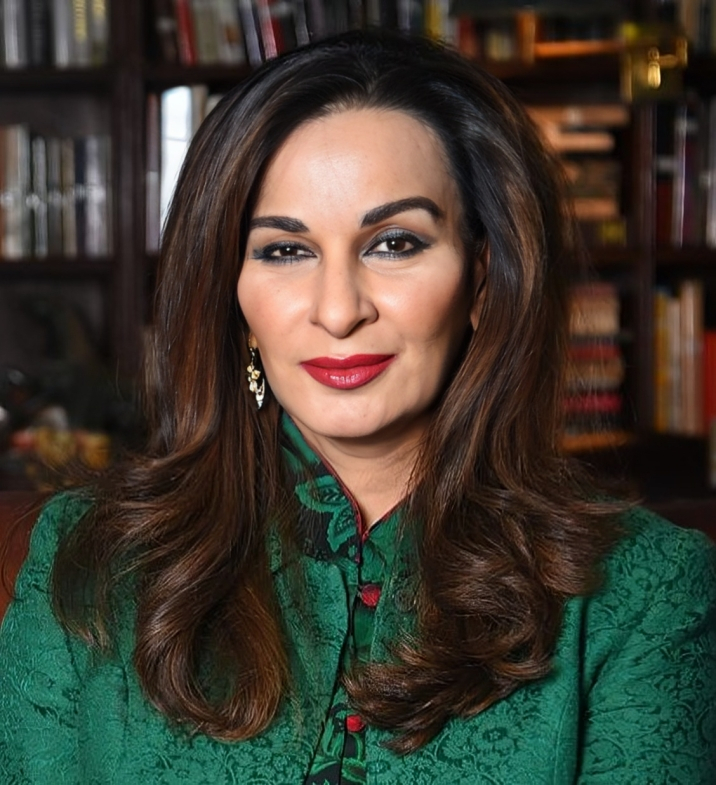
Senator Sherry Rehman, Federal Minister: Good Evening, Bismillah-ir-Rahman-ir-Raheem, Thank you to Pathfinder before anything else for having all of us here, and bringing Pakistani representation to Davos. So Ikram Sehgal, the moving spirit, and I’m sure your fantastic team everybody here, whomever has contributed, thank you, and I look forward to a rich and hopefully productive discussion with all of you.
I don’t particularly want to talk at the audience because you’re all very informed people but Huma has been very kind and insists that I do power talk for 20 minutes, whatever that means. But first of all I think two caveats, I did want to talk about women and power because that’s an intersect that has always interested me. I’m not speaking from a prepared text, I think it’s important to be authentic and relatable to a small audience or even a big one. I think that is the crisis of democracy in all liberal capitals of the world, privileged elites are not seen as relatable, and I think that’s the first thing we need to change. So, with your permission, I’d like to elaborate on why I said the ghost of the pandemic, was because Ikram initially asked me to speak about women and health which is an old fruit we can all talk about, but to get to contemporary realities and the global transitions, we’ll have to discuss this. The only thing I’d actually written down was the title and “vulnerability in the age of global transition”. So I don’t only want to speak about Pakistani women, the statistic I have shared in terms of abuse and domestic violence and abuse was a global one, it’s not something you read about, it’s not something you every day hear about, it was shared at a “Women in the World” conference in the UK, just at the beginning of the pandemic two years ago. It was shared by the Duchess of Cambridge, is not exactly on the fringes of outside activism in the world, that’s the main theme active over here.
So these are the statistics of shame for the whole world, and the pandemic was unique in the sense that it came on as an existential crisis for Pakistan, for all unequal societies, as well as the rest of the world. I think everybody saw it as a huge challenge to humanity, and of course to the earth giving us messages that its biodiversity has been so long exploited that is really pushing back, and that there is no default setting by which nature will just go back on its own, and keep on yielding its riches that we have been mining for at least a century, and that is the age of the Anthropocene. Being the first century, where humankind and [mostly mankind women are less extractive], have just exploited fossil fuels, manufacturing, and the rise of industrial revolution in the west, the big steel and coal mills, all that.
In a way they have reshaped our relationship with nature, the earth with the flora, the fauna and now of course how we perceive the climate, and women are at the epicenter of all such intersects, where societies are in turmoil, conflict or divide, have shown consistently, even [during] wars that women and other vulnerable actors including religious minorities and other ethnicities, that are not on top of the chain or the ladder of privilege, have experienced loss, violence, and a great deal of trauma during all crises. So the pandemic was one of them, and its ghost lingers on because I certainly did not say girls or children not going to school was nothing, I said in comparison the statistic of real shame is how women found their homes, a site of violence and fear. The place that is supposed to protect you, often intimate partner violence was the trigger and the statistic of shame for a world that is still insisting. It is fighting not just for justice but is declaring an ambition as all liberal democracies are an ambition for redistributive justice, gender justice, and it’s mainstreamed in all our conversations.
It is a politically correct term just like making an energy transition to renewables is for climate practitioners, but really, here’s where two things converge for me; climate as well as women, and the pandemic are all entangled together, a huge transition is going on in the world. It’s not just the war in the Ukraine that’s going to reshape our lives, as half of the forum wants us to believe, or even other conflicts where refugees and migrants have become the norm rather than the exception, and one in every 13 people in the world is a migrant, this was after the Syrian War erupted, and so I’m not going to give anybody a free pass on saying that well, a European refugee is for instance to be more worried about or [is to be] a driver of public anxiety than say an Afghan, Iraqi or Syrian Refugee. So Brown Lives Matter, as do women’s lives and what we were taught in all schools of public policy and in the history and through our engagement with liberal democracy was that it was seeking not just redistributive justice, but also the value system was supposed to be the leveling of social and other pyramids that includes patriarchies, it includes inequalities and injustices done in the name of geopolitics or grand strategy all over the world. And for those of us who don’t speak out, well then expect to sit, boil up in front of the TV and become armchair critics and then get on with it, don’t complain, because everybody here is in a position of privilege. Davos itself is a seat of privilege, it’s a seat of the corporate world coming together and guess okay a lot of back slapping goes on, but at least conversations that are tipping and raising the level of awareness to global problems, to existential inequalities are also being made. There is actually an equality lounge somewhere, I’m planning to go there. [laughter]
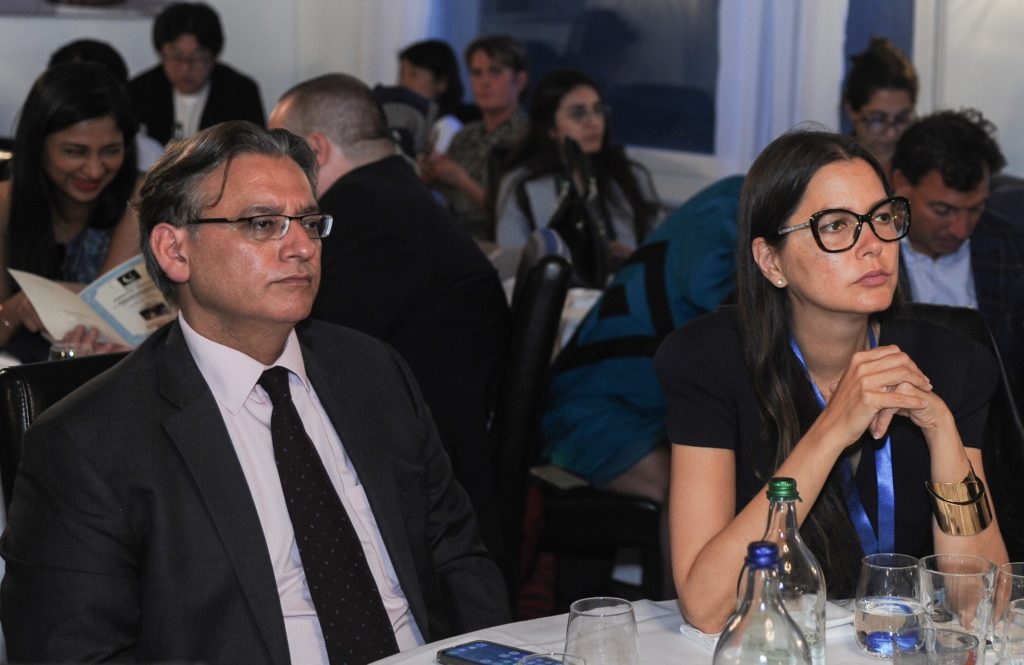
So I think in its diversity despite it being 1 percent of the 1 percent and especially of the corporate world, it has to be given a constant and repeated message of taking responsibility because it is not the vulnerable, the woman or the child or the refugee who is responsible. I don’t want to call anybody a victim because that strips them of any agency, but that’s what they are and that strips people of autonomy to make decisions about their lives, their bodies, let alone their futures or access to education and opportunity, yes we hear privilege stories of rags to riches, but those are exceptions, the structural norm is still an unglamorous side of human history, and now we’re sitting in the anti-chamber of the climate apocalypse, and we’re still mouthing words that take us quite far from telling it like it is, because ladies and gentlemen, we will hear net zero everywhere, but we are very far from net zero. That net zero requires a commitment to keeping temperatures not going above 1.5 percent at the pre-industrial level, that is what it is. Right now any data, any climate scientist will tell you that we are not even close to that one degree more or half a degree more, by the end of the century will take you to xyz scenario, so you’ve all seen on live streaming or Netflix or Hollywood all the post apocalypse movies.
When I was growing up they were all about nuclear bombings, and what happens to the world after a terrible nuclear Armageddon, if you like, and in that Armageddon you saw a completely dystopic world, well now that Armageddon is being created by us in our everyday lives, in our carelessness to the global commons, to the earth’s resources and how we continue to live carbon intense lives. And at least my generation has done that we have driven cars and flown planes and we continue to do that without thinking and using water unthinkingly, these are resources drying up very fast and we are now passing the torch of Climate Championship, Women’s Leadership all other such difficult propositions to the next generation, because we did very little about it on the whole. I’m not, there may be a room full of exceptions here but so that’s what we’re doing, we’re passing on that burden and still blindly ignoring our responsibility to the future, even to the now. Look at the Pakistanis in the room I want to specifically speak to the Pakistanis about this one point, are you aware that by 2025, by UN estimates, because we don’t have any estimates, because we have not bothered to even estimate, where we will be, plot our future or do some scientific modeling, by 2025, by UN standards not 2035,45,55 or some remote future where we can strike a bargain within action, we will be water scarce that means you will be rationing water like Cape Town, and I think people need to wake up to that reality and when you ration water, of course the women will be the ones getting the water, everywhere in the world. There’s some scary statistics of how far women walk every day in urban centers and in the fields and villages to be the nurturer, who brings home the water, that’s how it is. It’s not always found in a tap in your bathroom, it’s found in community wells even in cities under pressure, where there’s not enough water. Whether it’s Karachi or Mumbai, there is an underclass which is buying or getting water from community camps, it’s the women who are fetching it. In Pakistan alone, women walk at least two to four kilometers at the minimum everywhere today to get water, to fetch water.
So I’m just trying to humanize the problem for you, and for how any great crisis or transition as we’re conveniently calling it, impacts the vulnerable, the weak, the dispossessed and those who have already been living with a terribly exploitative metastructure of the patriarchy. Now, nobody even talks about the patriarchy anymore this is such a 1980s term, when the women movement was raging, it’s just dead in the water, we just maybe speak now about misogyny but those are two different things. The patriarchy, the system which is bought into where women have less seats at the table, where they speak less, where they’re brought up to be graceful, which means you don’t really push for your seat at the table. Let alone the dining table or the scraps that are brought down to the girl child as she does not go to school because when the choices are to be made, the men are privileged first, whether it’s for nutrition, access to health care or going to school, for girls it is seen as a privilege. For the boys it is a necessity. That is how the world still is, and that my friends is called patriarchy. That’s the system that runs this and there is a silent accommodation from the elites to the bottom of the pyramid whether it be a ‘Jirga’ which is making decisions for women’s lives, who they marry, what choice they exercise, now they’re reversing legislation even in the United States. So it’s happening everywhere and all of you who go to Sindh Club and Punjab Club, stop going there, you’re not full members over there because you’re a second class citizen against the constitutional party. What you are signaling is that you are willing to accept it, good luck to you and your daughters, because you are colluding in a world that allows you, that forces you, that tells you that you’re really not a first-class citizen, and that’s the only thing you are in Pakistan. There are very few joys of citizenship as we all know, but that is what you are and you negotiate or bargain that away for a lunch with friends.
The people go next door on Women’s Day, everybody’s marching, and fun slogans, provocative stuff not even an agenda, but very real asks from patriarchy. Because there is a hardcore to women which I have actually written about in this book, it’s the real heroes who have contributed to change in Pakistan, which we all take very casually. It was not given to us, it was taken from a very hard fight, a bit like the suffragettes in the 19th century, who had to keep going to jail and in rigorous conditions we did too. Nobody knows about it, but most of us in the 1980s, were often in unhealthy, nasty, prison lock-ups every week because we said, no we are not going to accept a dictatorship’s laws that tell you if a woman is raped, she needs four witnesses to actually validate it, and report it as a crime. You know what that means, it means that four men needed to be watching it, why would they be watching it and collude it? So they would need to be verifying that if she reported rape as a crime against her, because rape is now crime against the state, say thank you very much sisters who did all this, she would be down for a case of adultery. If you reported rape and you wouldn’t provide four witnesses ascertaining your said rape, you were then liable for a charge of adultery in the 1980s. I’m not making this up, this is what brought people like Asma Jahangir and me together, that’s how we met on the street and just by reading it in the paper, so a little bit we need to come out a little bit out of our comfort zone. I know elites don’t like doing that, they give money at a big charity gala and we appreciate that money but I’ve done that myself because we directed hospitals for women on that money, but you’ve got to do more than show up at charity galas and lighten your wallet for an auction. You’ve got to do more than that, specifically the men and the women in this room. I’m not going to hector you anymore, I’m just going to address any questions you may have or just let you get your dinner because the worst thing anyone wants after a long hard day is anyone standing between dinner, so thank you very much for your patience.
Question & Answer Session:
Question 01: I just wanted to ask her, politics aside, does she agree with the 10 billion Trees Tsunami Program that was launched under the previous government, and what are her comments on it, it has had international accolades as well and will she or will the government now also continue that push?
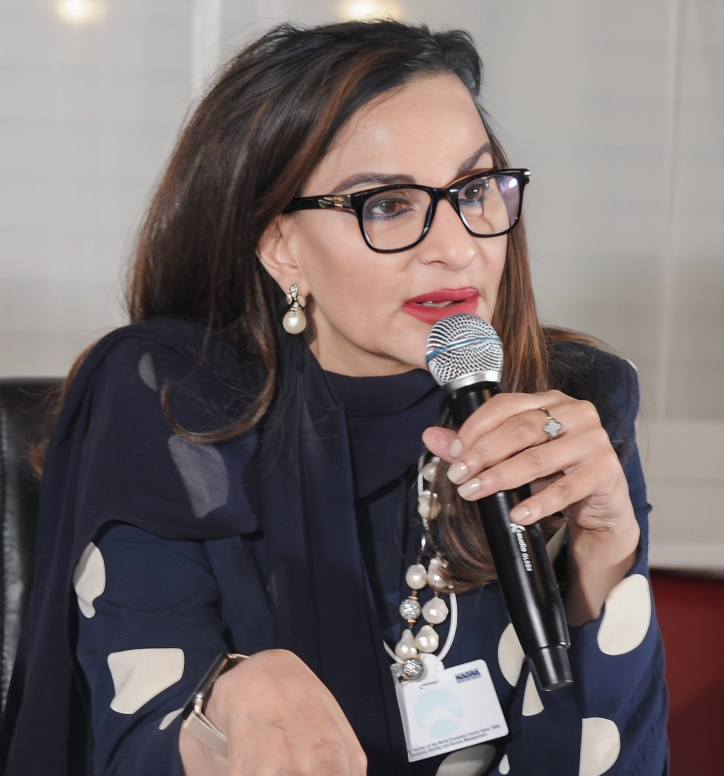
Senator Sherry Rehman, Federal Minister: Thank you very much and it’s a germane question because that’s the only policy or project initiated in any sense for climate mitigation, and you know reforestation is something no one would walk away or should walk away from, but you asked about the 10 billion tree tsunami. Before that there was a billion tree tsunami. I don’t want to be here and create partisan divides, there is an inquiry on one of them, on the 10 billion tree tsunami, because all the four provinces, AJK and Gilgit Baltistan also is equally matched in funds and ambition by the provinces and GB as well as AJK, and the highest performer in the 10 billion tree project unknown to man or beast is the province of Sindh.
When I disagree, when I pulled up the presentation, they said oh well we didn’t know about it, because there was a political disconnect and even the map suggested KP. I think KP really needs the reforestation and of concern to me right now is not politicizing the discourse but also, well politics is essential to climate discourse, without politics you won’t get anywhere or have any stakeholder buy-in, and without stakeholder buy-in, it’s never going to be a movement, and it’s never going to be a movement and you’re never going to do anything about it.
Climate is always owned by people, not governments only, and here’s an issue; even on the drive from Zurich to Davos. The ambassador kept saying you’re not looking up from your phone, I said believe me I was really looking forward to the two or three hours drive, but I couldn’t because there were forest fires all over Pakistan. There were forest fires all over Margalla, and there were forest fires over Khyber Pakhtunkhwa, the borders are very close. Then there’s a huge catastrophic fire in Balochistan in all the juniper forests which are very hard to cultivate, they provide livelihoods, the juniper provides the Chilgoza which has already become very expensive, which was a staple we just grew up with thoughtlessly in the winter, and now so that fire was raging for a week, and my mandate is Climate Minister’s to make policy for the federation and deal with international agencies, and what happened was that we don’t have the mandate or the resources but I actually zoomed Balochistan on from the ministry with the secretaries, and I said please tell us what you need, it’s one week and the fire is not abating, it’s like you know one of those California wildfires and how can we help, and he said oh yes we’ve had three firefighters killed, and that’s a terrible humanitarian crisis along with that, because I had NDMA which is our disaster management authority, the federal one in the room, I said tell us how you can help? So they sort of moved their resources and the plane with the bowser etc. It was still on when I left.
I did speak to the prime minister, into his office and I said, it’s time now to really look at out-of-the-box solutions, while everybody kept saying prevention, I said, right prevention is a good idea and I keep asking here whom should I meet for assistance, because people are offering assistance on Twitter. They’ve seen me talking about it and not burying the subject and those forest fires even the Margala ones as I was leaving were igniting and reigniting after we put them out, because the velocity and speed of the winds, the hot winds are like savannah winds are so high that the direction keeps changing. We took care of it, and when it wasn’t going out in the Margallas of KP, I said tell NDMA to get their plane and they’re like no, all resources are deployed in Balochistan which is the right thing to do. So, I said well next step is just pray to God for rain, but you know, hope is not a plan, seriously and while we were able to put it out, it took a while and who’s to say that the April to June window of forest fires won’t expand or become more intense. And now the Foreign Ministry has had to ask Iran for a special bowser plane that they have to come in and do the needful and hopefully we’ll have some relief in the Zhob fires, but they’re actually huge and it was only social media that was reporting it for six seven days. So one of the good things about social media, they are providing us a window, real time into the universe, the only problem is we’re never looking up from those phones then.
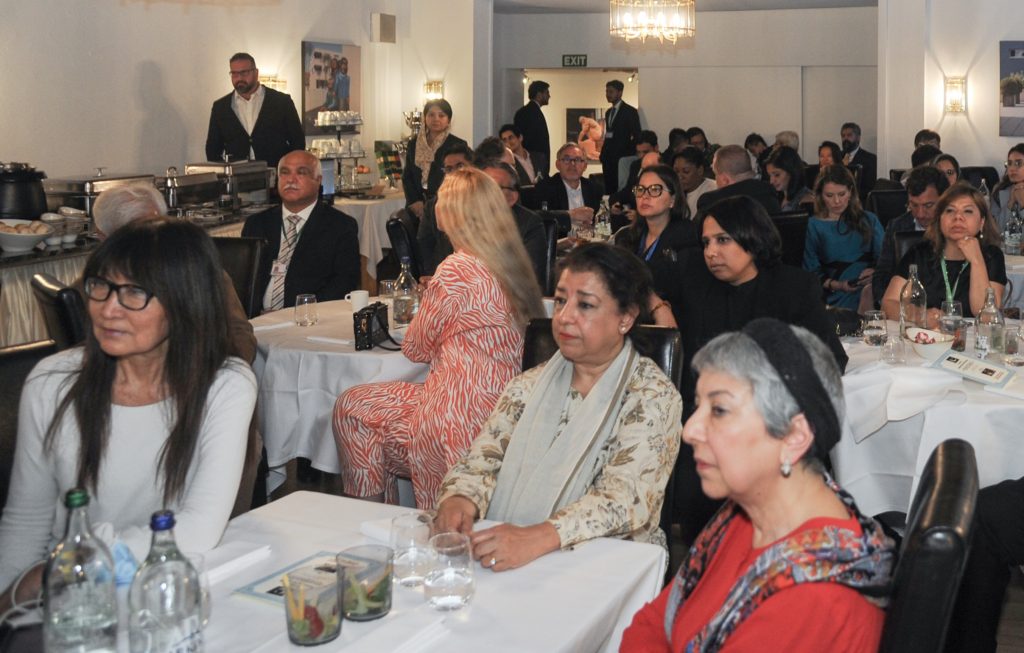
So I think forestation is very important, but it’s a long term thing and one of the adaptation sessions here. See what I mean Ikram sb, this is not a great time to be speaking, which I completely understand, so it’s not a long term thing. Mitigation is basically a luxury which we should all undertake but the entire global south needs to take adaptation as the center of their strategy. We are way behind even our net zero targets, Pakistan hasn’t even committed to a net zero target yet, and I wouldn’t come up with a commitment till there are benchmarks, there was no point announcing policies on paper and then just walking off. We are working on the benchmarking with other line ministries, because it’s actually big petroleum, big energy, big chemical that has to make the switch, and that’s a thousand years of a century of bad habits which I still don’t see the west doing so two wrongs, don’t make a right.
Dr. Huma Baqai, Sr. Vice Chairperson KCFR: Thank you Sherry, it’s nice to have a Minister who knows what she’s talking about, seriously. So I have a very interesting statistic here that I would want the Senator to respond on, we talked about domestic violence going up during the pandemic, but something very interesting happened in Pakistan and that is during pandemic the divorce rate in Pakistan went up phenomenally. Never before in one year, so many divorces were filed for and this was happening in middle class families. So what I want to perhaps ask Sherry here is that the beginning of the tide turning where women are really standing up for their rights and coming out in the open about what’s happening, and also how my favorite sentence ‘terrible husbands are making fantastic fathers.’
Senator Sherry Rehman, Federal Minister: I mean divorces is a right and certainly in my religion too and it’s made quite easy for women to seek, you don’t have a one year to hang around waiting, but then again the joint resources are not always split evenly. So I don’t think that’s an indication of autonomy; the divorce rate going up, is not an indication of autonomy to me at all, I think what is an indication of autonomy would be more jobs, less of a pay gap, income gap between women and men still is huge even here, something like 59 cents to the dollar. Still, you can imagine what it is in Pakistan and lastly I just want to say that women in the workplace are categorized in Pakistan as 20 percent only, but they’re working the fields, they’re working the fisheries, the factories, the garments, sweatshops all of that, and doing a dual burden at home. So really, they’re powering the economy and sort of gender mainstreaming is just a word, it’s not being done and at the end of the day, there’s no point hand-wringing, no one’s going to do this for you, we’re all just going to have to do it for ourselves, that’s where we are, the whole business of autonomy pivots on choices people can make. I’ve been trying to pass a simple bill in the federation that says, women should have the right to choose who they marry or not be married off before 18, because they don’t get a driver’s license, you don’t get to vote, you even go to juvenile prison until you’re 18. But to marry it’s okay, you’re allowed to marry or ask to marry or forced to marry or coerced into a partnership. Women are not adults before they’re 18, neither are men, so that bill is not going through, it’s gone through in the province of Sindh only, and once the law goes through, it’s hard to adjudicate and you know execute policy but there it is at least it’s law. So if I’m being forced to marry somebody as opposed to divorce somebody before I’m 18, then at least my case will be registered as xyz versus so and the state is on your side, so laws make a difference, they give power.
Lastly, very quickly, what did the pandemic tell us that health choices – now, if women are not empowered to choose, they can’t vote till they’re 18, they can’t drive till they’re 18, they’re classified as a juvenile for all other intents and purposes. But no marrying is fine and a spin-off of that no health choices are available, so something like 40 percent of women have made reproductive health decisions, according to some international agency, 40 to 40 percent something, and that percentage is really quite shocking because it’s one thing if you’re not being able to access optimal healthcare on time, it’s quite another not having the autonomy or the information and both to make that choice. So if you’re stripped of informed choices as to when to space your children, for instance, or pregnancies, then you’re going to have high morbidity and mortality which is extremely high in Pakistan. And not only that, not just structurally, it’s an entire culture of women put into the service of childbearing, whether they are ready emotionally or their bodies are healthy enough to carry a healthy child to full term and expect both to survive, and be looked after and provided the nutrition they so need. So that’s all linked to the choices made to marriage and you have to make all sorts of arguments to get this kind of legislation passed. But it’s still sitting, it’s been over a year now, it’s still sitting around being discussed, what’s to discuss I ask, but there we are, so at least one province has passed it and some legal cases have found women whose families have also helped them resist being pulled into child marriage. So, child marriage needs to be criminalized surely, as do first choices on pregnancies, and no access or no information about healthcare. To me that’s a real crisis, not the divorces. Thank you.


